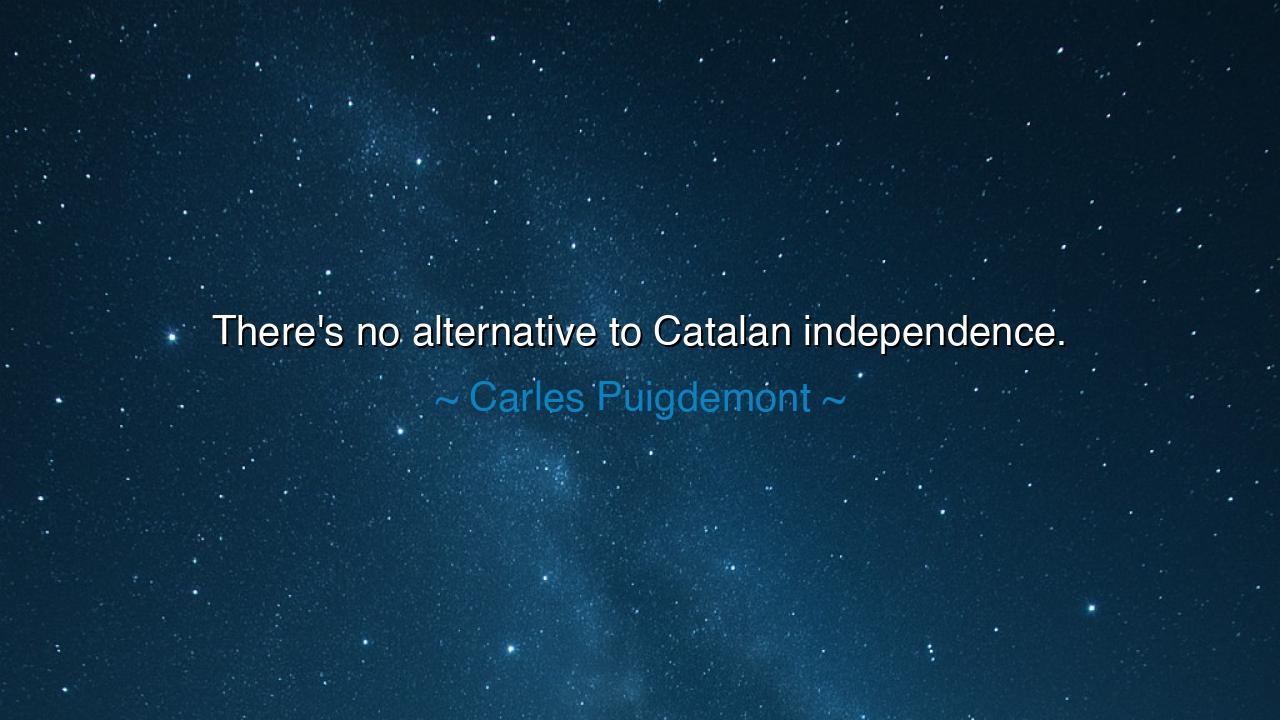
There's no alternative to Catalan independence.






The words of Carles Puigdemont, spoken in defiance and conviction, echo with the thunder of history and the quiet determination of a people long denied their will. When he said, “There’s no alternative to Catalan independence,” he was not uttering a mere political slogan—he was giving voice to the eternal cry of nations seeking to be masters of their own destiny. His declaration rises from centuries of struggle, from the heartbeat of a people whose language, culture, and spirit have endured through conquest and suppression. It is a call to identity, to self-rule, and to the sacred right of a people to shape their own future.
To understand the meaning of his words, one must understand the man and the moment. Carles Puigdemont, the former President of Catalonia, stood at the center of one of the most turbulent political chapters in modern Spain. In 2017, his government sought to hold a referendum on Catalan independence, defying the laws of the Spanish state, which declared such an act illegal. Yet, despite police raids, arrests, and international opposition, millions of Catalans went to the polls, risking their safety to make their voices heard. For Puigdemont, this was not merely politics—it was principle. When he said, “There’s no alternative,” he meant that for a nation that has tasted the possibility of freedom, compromise becomes impossible. Once a people awaken to the truth of their sovereignty, no decree, no threat, no prison can silence them.
This longing for self-determination is as old as humanity itself. In the annals of history, every nation that has ever risen from the shadow of another has walked the same path—one marked by defiance, sacrifice, and hope. Puigdemont’s Catalonia stands in the lineage of Scotland, which sought independence from England; of India, which broke free from British rule; of the American colonies, which defied a king to establish a republic. In each case, there came a time when patience could no longer coexist with pride, and compromise could no longer coexist with conscience. That moment, Puigdemont declared, had come for Catalonia.
His words also speak to something deeper than politics: the soul of identity. For centuries, Catalonia has preserved its language, its traditions, its way of thinking. Even under dictatorship—when speaking Catalan was forbidden, when cultural expression was suppressed—the people endured. Like a river that vanishes underground only to resurface stronger, their spirit flowed unseen but unbroken. Puigdemont’s assertion of independence is, therefore, not only about governance—it is about dignity. It is about saying, “We will not ask permission to exist.” It is the same sacred defiance that has driven poets, rebels, and dreamers throughout history to rise against the weight of empire.
There is a story that mirrors this spirit—the story of Ireland, whose struggle for independence spanned centuries of subjugation. The Irish, like the Catalans, were told their culture was inferior, their language a relic, their dreams of self-rule impossible. Yet, through famine, exile, and bloodshed, they clung to their sense of identity until, in 1922, the Republic of Ireland was born. The cost was immense, but to them, as to Puigdemont’s Catalonia, there was no alternative. For when the spirit of a people awakens to the call of freedom, even the threat of ruin becomes preferable to the comfort of subservience.
In the voice of the ancients, we may say: freedom once dreamed cannot be forgotten. Puigdemont’s declaration is not a prophecy of inevitability, but a statement of will. He does not claim that independence will come easily, but that it must come, because anything less would be a betrayal of the generations who kept the Catalan flame alive. His words remind us that independence—whether of nations or of individuals—is not a gift bestowed by rulers, but a birthright that must be reclaimed through courage and conviction.
Yet his quote also carries a warning. The path to independence is strewn with peril. Those who walk it must bear the burden of division, of exile, of uncertainty. Puigdemont himself was forced to flee into exile, to continue his struggle from afar. But even in exile, the conviction behind his words did not waver. He understood that independence, like truth, demands patience and endurance—that even in defeat, the idea lives on, waiting for another generation to rise and carry it forward.
The lesson in his words is universal: whether for a nation, a community, or an individual, freedom is not given—it is earned through the refusal to surrender. To seek independence is to embrace responsibility, to accept the hardships that come with self-determination. It means valuing dignity above comfort, and vision above fear.
And so, the practical path is this: stand firm in the pursuit of what you know to be just, even when the world calls it impossible. Let your independence—be it personal or collective—be guided not by anger, but by purpose. Work to build what you dream, for freedom without creation is fleeting. As Carles Puigdemont reminds us, there are moments in history when compromise ceases to be virtue, and courage alone becomes necessity. When that moment comes, as it does for every soul and every nation, remember these words: there is no alternative to the truth of who you are, and to the freedom that truth demands.






AAdministratorAdministrator
Welcome, honored guests. Please leave a comment, we will respond soon